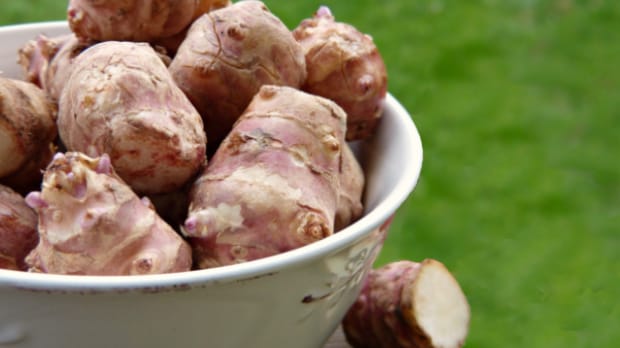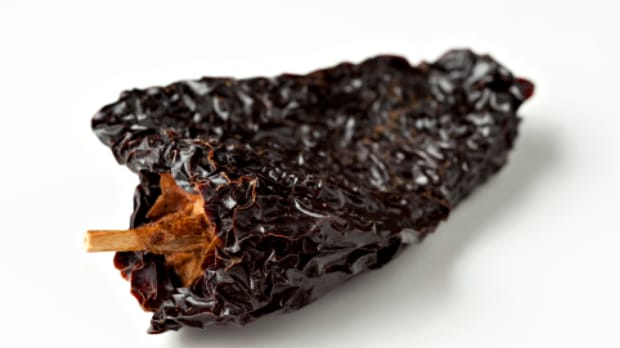What is Jerusalem Artichoke?
The Jerusalem artichoke, despite its name, is not actually an artichoke at all. Rather, it belongs to the sunflower family. However, its flavor is reminiscent of the globe artichoke. This interesting vegetable is native to North America, and was a part of the Native American diet long before the arrival of European settlers. It is also known by the name “sunchoke.”
The Jerusalem artichoke is a tuber, similar in appearance to a ginger root, and can be prepared in a variety of ways. It is highly versatile and can be roasted, boiled, mashed, or sautéed. In terms of nutrition, the Jerusalem artichoke is a great source of fiber, iron, and potassium. It has a low glycemic index, making it a great choice for those watching their blood sugar levels. If you haven’t tried this unique vegetable yet, give it a go! It’s a tasty and healthy way to add variety to your meals.
- What is Jerusalem Artichoke?
- What are the Nutritional Benefits?
- Types Available
- What are the Best Uses?
- How do You Store Jerusalem Artichoke?
- How to Prepare Jerusalem Artichoke
- When are Jerusalem Artichokes in Season?
- What to Serve Jerusalem Artichoke With?
- What Traditional Cuisines Use Jerusalem Artichoke?
- Tasty Recipes
- Key Takeaways
What are the Nutritional Benefits?

If you are looking for a nutrient-packed addition to your diet, consider adding Jerusalem artichokes to your plate! Also known as sunchokes, these tubers are loaded with vitamins and minerals that can do wonders for your health. One of the biggest benefits of Jerusalem artichokes is their high fiber content. This aids digestion and can help keep you feeling full and satisfied after meals. But fiber is just the beginning when it comes to the nutritional benefits of these underrated superfoods.
Jerusalem artichokes are also packed with vitamins and minerals like potassium, iron, and magnesium. These nutrients can help support your immune system, reduce inflammation, and even improve your heart health. But that’s not all – Jerusalem artichokes also contain prebiotics, which can help nourish the beneficial bacteria in your gut. This can have a positive impact on your overall health and wellness, from your digestion to your mood. So next time you’re at the grocery store, don’t overlook the humble Jerusalem artichoke! Incorporating these nutritious tubers into your diet can provide a range of health benefits that are sure to leave you feeling your best.
Types Available
Are you looking for something different to add to your meal plan? Have you ever heard of Jerusalem Artichokes? They are a type of root vegetable that you may be interested in trying. The Jerusalem artichoke, also known as the sunchoke, has a unique flavor profile that can add a subtle sweetness to your dishes. But, did you know that there are different types of Jerusalem artichokes? Some varieties you’ll find are: clearwater, stampede, white fuseau, dwarf funray, passamaquoddy, red fuseau, and mammoth. The biggest difference between varieties is the skin color, which comes in white, yellow, red, and purple. Jerusalem artichokes are a great option for those looking to add some variety to their vegetable repertoire. With the different types available, it’s easy to find one that suits your taste buds.
What are the Best Uses?

If you’re looking for a unique, delicious, and nutritious vegetable to add to your diet, consider trying Jerusalem artichokes! Also known as sunchokes, these nutrient-dense tubers are a great source of fiber, vitamins, and minerals. There are many great uses for Jerusalem artichokes in the kitchen. When cooked, Jerusalem artichokes are a good substitute for starchy vegetables like potato. Also consider trying it raw as a swap for jicama or water chestnuts. Here are some of the best ways to enjoy this tasty and versatile produce:
Roasted: Slice the Jerusalem artichokes into thin rounds and toss them with olive oil, salt, and pepper. Roast them in the oven until tender and crispy. They make a great side dish for any meal.
Soup: Chop the Jerusalem artichokes into small pieces and cook them in a pot with chicken or vegetable broth until they’re soft. Blend the mixture until smooth and creamy, and enjoy a delicious soup that’s perfect for cold winter nights.
Mashed: Boil the Jerusalem artichokes until they’re soft, and mash them with butter, milk, salt, and pepper. Serve them as a tasty, nutrient-packed alternative to mashed potatoes.
Salad: Slice the Jerusalem artichokes thinly and add them to a salad with mixed greens, cherry tomatoes, and avocados. Toss with a vinaigrette dressing for a healthy and delicious lunch.
Overall, Jerusalem artichokes are a flavorful and nutritious vegetable that can be enjoyed in a variety of ways. Give them a try and see how they can enhance your meals and your health!
How do You Store Jerusalem Artichoke?
If you’ve picked up some Jerusalem artichokes at the grocery store or farmer’s market and you’re wondering how to store them, we’ve got you covered. These knobby little root vegetables actually store quite well, and can last up to several weeks if kept in the right conditions. The first step is to give them a good wash and scrub to remove any dirt or debris from the skins. Then, make sure they are completely dry before moving on to the next step. You don’t want any water remaining on the vegetable, as this can lead to mold or rot.
Next, find a cool, dry place to store them. A dark pantry or garage is ideal, as long as the temperature remains between 32 and 40 degrees Fahrenheit. A root cellar or even the crisper drawer in your refrigerator can also work well.
Another option is to wrap the Jerusalem artichokes in paper towels or a cloth and place them in a paper bag. Make sure to poke a few holes in the bag to allow air circulation. Remember to check on them every few days and discard any that show signs of decay or sprouting. By storing your Jerusalem artichokes properly, you can enjoy this versatile vegetable in a variety of recipes throughout the winter months. Happy cooking!
How to Prepare Jerusalem Artichoke
Hey there! Are you wondering how to prepare Jerusalem Artichokes? Don’t worry, it’s easier than you think! First, grab a scrub brush and give those knobby little suckers a good scrub. You want to remove any dirt or debris. Some people prefer to peel them, but it’s not necessary. Then, slice them into thin coins or chop them into small pieces.
Next, you can either roast them in the oven with some olive oil, salt, and pepper until they’re golden brown and crispy. Or, you can sauté them in a pan with some garlic and onion until they’re tender and caramelized. Both methods create a delicious and nutritious side dish.
And did you know that Jerusalem Artichokes are a good source of iron, potassium, and fiber? Plus, they have a subtle nutty flavor that pairs well with a variety of herbs and spices. So, give them a try! Your taste buds and your body will thank you.
When are Jerusalem Artichokes in Season?
Are you a fan of the unique and nutty flavor of Jerusalem artichokes? These vegetables are also known as “sunchokes” and they are quite versatile in the kitchen. But when is the best time to get your hands on this produce? Generally, the season for Jerusalem artichokes runs from late fall to early spring. This means that you can expect to find the freshest and most flavorful sunchokes during this time. However, don’t be surprised if you can still find them on the market during the summer months.
One thing to keep in mind is that these vegetables tend to store quite well. If you do come across Jerusalem artichokes outside of their typical season, don’t hesitate to try them out. Chances are that they will still taste delicious and provide that perfect nutty flavor to your favorite recipes.
Improve Your Health With Seasonal Eating
What to Serve Jerusalem Artichoke With?
- Olive Oil and Sea Salt
- Cauliflower
- Mushrooms
- Bacon
- Lemon Vinaigrette
- Leeks
- Parmesan
- Nutmeg
- Garlic Aioli
- Herbs
What Traditional Cuisines Use Jerusalem Artichoke?
Jerusalem artichokes are commonly used in Italian and French cuisines, as well as in Middle Eastern dishes. They can be eaten raw, boiled, fried, roasted, or pickled, and can be used in soups, stews, salads, and other recipes.
Tasty Recipes
- Spice-Roasted Cauliflower and Jerusalem Artichokes
- Jerusalem Artichoke Soup
- Jerusalem Artichoke, Pear and Prosciutto Salad
- Jerusalem Artichokes and Potato au Gratin
- Warm Artichoke, Blood Orange & Feta Salad
Key Takeaways
- Jerusalem Artichokes are a good source of dietary fiber, potassium, iron, and vitamin C.
- Before cooking, make sure to scrub the artichokes well and cut off the tips of the stems.
- Jerusalem Artichokes can be boiled, roasted, sautéed, or eaten raw in salads.
- To add flavor to Jerusalem Artichokes, try adding herbs and spices like garlic, thyme, rosemary, and sage.
- Jerusalem Artichokes should be cooked until tender and served warm with butter or olive oil.
- To store Jerusalem Artichokes, keep them in a cool dry place and they will last up to two weeks.
References: A Review of Jerusalem Artichoke (Helianthus tuberosus L.) as a Potential Functional Food | The composition and properties of Jerusalem artichoke: a review | Bioactive Compounds, Antioxidant Properties and Health Benefits of Jerusalem Artichoke (Helianthus tuberosus L.): A Review | The Potential Use of Jerusalem Artichoke (Helianthus Tuberosus L.) as an Important Functional Food: A Review | <a href="https://www.mdpi.com/2072-6643/11/




